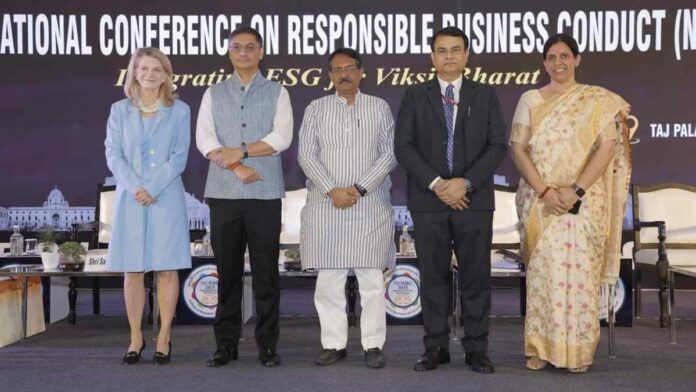INDIA: The Indian Institute of Corporate Affairs (IICA) inaugurated the third edition of the National Conference on Responsible Business Conduct (NCRBC 2025) at the Taj Palace Hotel in New Delhi. Held on July 2–3, the conference focused on the theme “Integrating ESG for Viksit Bharat,” highlighting the importance of environmental, social, and governance (ESG) frameworks in shaping India’s development trajectory toward 2047.
The two-day event brought together over 500 participants, including business leaders, policymakers, regulators, academics, and sustainability professionals. Discussions centered on aligning corporate practices with ESG principles, particularly in light of India’s aspirations to become a developed nation by 2047.
Also Read: Dairy Australia Appoints Dr. Matthew Shaffer as New CEO Amid Strategic Transition
Policy and Industry Alignment
Opening the event, IICA’s School of Business Environment emphasized the role of ESG in national development strategies. The conference builds on IICA’s previous contributions to policy, including the National Guidelines on Responsible Business Conduct (NGRBC) and the Zero Draft of the National Action Plan on Business and Human Rights.
Union Minister Harsh Malhotra, Minister of State for Corporate Affairs and Road Transport & Highways, delivered the keynote address, noting that ESG has become central to responsible business practices in India. Sessions throughout the summit covered a wide range of topics, such as sustainable finance, supply chain responsibility, workforce transitions, decarbonisation strategies, and global ESG reporting frameworks like BRSR, CSRD, and IFRS.
MSME Inclusion and Capacity Building
Gyaneshwar Kumar Singh, Director General and CEO of IICA, highlighted the need for broader ESG adoption across sectors, particularly among India’s micro, small, and medium enterprises (MSMEs). Singh announced IICA’s plan to offer discounted ESG training courses for MSMEs, aimed at improving awareness and compliance.
Shift Toward Non-Financial Reporting
Charanjot Singh Nanda, President of the Institute of Chartered Accountants of India (ICAI), emphasized the growing relevance of non-financial disclosures. He stated that proper valuations now require ESG metrics as a key component of corporate reporting. ICAI’s related initiatives include the Sustainability Reporting Standards Board, a Carbon Emission Calculator, and a Sustainability Reporting Maturity Model.
Workshops and Global Engagement
A post-conference workshop on Strategic Climate Risk Management and Sustainable Finance is scheduled for July 4, offering hands-on training in emissions tracking, climate-risk planning, and sustainable finance tools. Key participants at NCRBC 2025 include Amitabh Kant, former G20 Sherpa, and C. Achalender Reddy, Chairperson of the National Biodiversity Authority, both of whom are contributing to discussions on international ESG diplomacy and biodiversity-linked finance.
Strategic Takeaways and Next Steps
Core themes of the conference include:
- Encouraging ESG integration across industries
- Strengthening public–private partnerships
- Improving access to ESG tools and reporting systems
- Enhancing alignment with global standards
Analysts suggest that NCRBC 2025 marks a shift in corporate thinking—where ESG is increasingly viewed not as an optional agenda but a strategic necessity. As international expectations around sustainability evolve, Indian companies are under pressure to keep pace.
The conference also underscored the importance of ESG in achieving broader national goals such as the Sustainable Development Goals (SDGs) and India’s long-term development plans. According to IICA, building institutional support and capacity—particularly for smaller businesses—will be critical for ensuring inclusive and sustainable economic growth.
Also Read: From Craft to Diplomacy: Atman Sandhu’s Unconventional Journey
